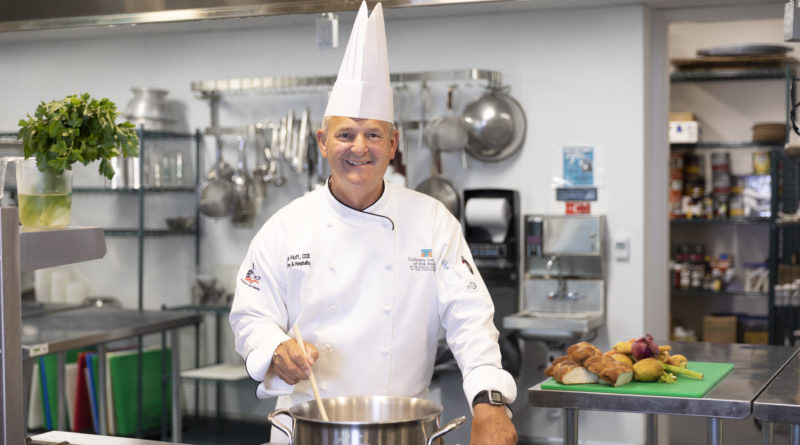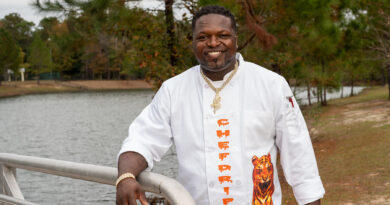Chef Miles Huff, Dean
Introducing TCL’s Culinary Institute of the South
The Lowcountry’s Recipe For Success
story by KAREN SNYDER
photos by PAUL NURNBERG
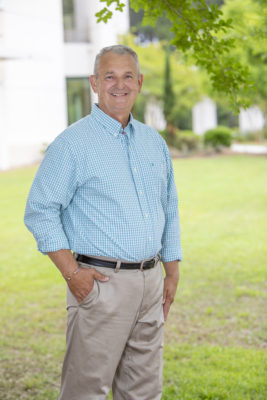 When you think about Beaufort, the Sea Islands, and the quaint towns of the Lowcountry, the word “hospitality” quickly comes to mind. From its delightful water views, the distinctive scent of pluff mud wafting off the marsh, and a welcoming coastal vibe, those not lucky enough to live here find ways to visit again and again. The region’s planter history long gone, tourism and the hospitality industry continue to be the economic drivers that will ensure the vitality of Beaufort and beyond.
When you think about Beaufort, the Sea Islands, and the quaint towns of the Lowcountry, the word “hospitality” quickly comes to mind. From its delightful water views, the distinctive scent of pluff mud wafting off the marsh, and a welcoming coastal vibe, those not lucky enough to live here find ways to visit again and again. The region’s planter history long gone, tourism and the hospitality industry continue to be the economic drivers that will ensure the vitality of Beaufort and beyond.
Chef Miles Huff, dean of the Technical College of the Lowcountry’s (TCL) Culinary Institute of the South, couldn’t agree more. Selected as the Institute’s dean in 2018 and the visionary responsible for a soon-to-be-open state-of-the-art 29,000 square foot culinary arts facility, Chef Huff’s passion is to help meet the community’s increasing need for qualified, experienced chefs and hospitality professionals.
“Beaufort is this beautiful community nestled along the way for those visiting Hilton Head and Savannah. People just can’t seem to get enough of this place. That’s why hospitality jobs are so numerous here,” says Chef Huff, adding that post-Covid opportunities in the industry have increased some 30 percent.
A native of Summerville, SC, Chef Huff is not new to training the next generation of Lowcountry chefs. With an impressive personal history serving as a U.S. Air Force medic, he was trained as a chef by the prestigious Johnson and Wales University, where he later taught as part of its world-renowned culinary program. When he taught high school in Sumter County, SC, he served as South Carolina’s winningest culinary team coach. He holds a B.S. in workforce development from Southern Illinois University and a master’s degree in management from South Wesleyan University. He is an American Culinary Federation (ACF) Certified Culinary Educator (CCE) and a National Restaurant Association ServSafe instructor and test proctor.
Credentials aside, Huff describes himself as a true Charlestonian and lover of Southern cuisine. He played an integral role for a decade in establishing the Culinary Arts program at Trident Technical College (TTC) in Charleston. Now, the energetic and passionate 60-something-year-old can’t contain his excitement about the vision and mission for TCL’s Culinary Institute of the South, spearheading the new facility’s design and construction and promoting the college’s comprehensive curricula.
Offered as a 7+7-week program (splitting the traditional 14-week semester into two parts), students may choose from among three disciplines: Culinary Arts, Baking & Pastry Arts, and Hospitality & Tourism Management. Both certificate and associate degree tracks are offered. “Any credits earned for those enrolled in a certificate program may be used towards associate degree completion,” explains Chef Huff, and also transfers seamlessly for those wanting to pursue a bachelor’s program at USCB. The Institute also offers dual enrollment programs for current high schoolers.
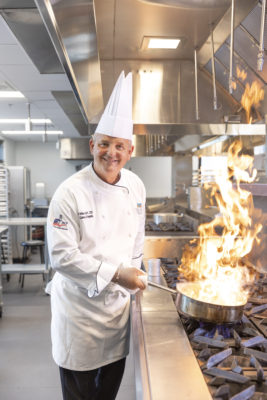 According to Huff, the new facility, located off Buckwalter Parkway in Bluffton, will not only have a positive economic impact here in the Lowcountry but will provide infinite possibilities for graduating students to travel and establish careers globally.
According to Huff, the new facility, located off Buckwalter Parkway in Bluffton, will not only have a positive economic impact here in the Lowcountry but will provide infinite possibilities for graduating students to travel and establish careers globally.
“All aspects of the new space have been designed with the students’ career and training in mind,” he explains, and includes six academic classrooms, two teaching kitchens, a bake lab, a café, a lecture theater, and even a teaching restaurant that will be open to the public. Visitors to the campus also will enjoy the on-site FOODseum, an interactive experience that brings to life the true story of Southern food and Lowcountry cuisine. “It’s about understanding our area’s rich food heritage and why Southern food is so popular. It’s more than about just shrimp and grits,” he laughs.
With approximately 70-80 students currently enrolled in the Institute’s culinary and hospitality programs, Chef Huff predicts enrollment will reach about 150 reasonably quickly to attract 400-500+ students. “It’s a portable profession that offers a wide variety of career opportunities that can take you anywhere in the world. If working traditional late-night restaurant hours doesn’t fit your personal or family’s lifestyle, there are plenty of other avenues to pursue such as being a private/personal chef, owning a food truck, pursuing food science or jobs in agriculture, or working for a resort, nursing home, or even a school system provider, such as Sodexo, where jobs often include great benefits.
“It’s the biggest industry in the world which is why our students often receive multiple job offers, some of them with lucrative sign-on bonuses!” In addition, the versatility of the industry attracts a diverse student population. From traditional students who have recently graduated high school to mid-life career changers, they want to fine-tune their work skills or seek additional professional development. Best of all, we found at TTC that 74% of our graduates remained working in the local area. That’s a significant boost to our local economic development.
“We truly have a niche for everyone — foodies, home cooks, or those simply looking for a creative outlet,” adds Huff. Whatever the reason for pursuing an education, Chef Huff says the program delivers. “We’re a place for learning. Give me a student with no cooking skills, and I’ll make them a great chef!”
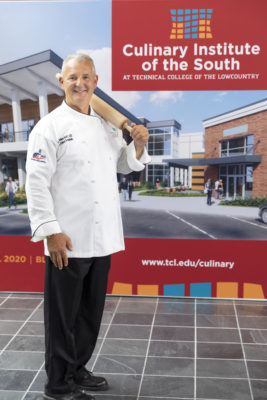 According to Chef Huff, he’s observed an increased interest in the industry amongst young people due, in part, to Culinary Arts programs now introduced at the high school level and also, he believes, from the marked increase in meal prep companies like Hello Fresh and Blue Apron which have sparked an interest in home cooking. Still, he says, “I want young people to know that food doesn’t come from a container. It’s not something that’s dumped from a box and cooked like powdered mac-n-cheese. It’s also important for students to understand how that granola bar went from farm ingredients to the grocery store shelf.
According to Chef Huff, he’s observed an increased interest in the industry amongst young people due, in part, to Culinary Arts programs now introduced at the high school level and also, he believes, from the marked increase in meal prep companies like Hello Fresh and Blue Apron which have sparked an interest in home cooking. Still, he says, “I want young people to know that food doesn’t come from a container. It’s not something that’s dumped from a box and cooked like powdered mac-n-cheese. It’s also important for students to understand how that granola bar went from farm ingredients to the grocery store shelf.
In some ways, it’s really about learning life skills. I want them to understand and know where their food comes from and how it grows on the farm. There are plenty of kids that don’t know that carrots and potatoes are grown in the ground or that peanuts aren’t grown on trees.” He adds, “Students in our program understand every aspect of restaurant management from seeing how food is packed when it is received, to how it is stored, to how much it costs. It’s about understanding what goes into establishing the price you see on the restaurant’s menu.”
What’s more, part of Chef Huff’s mission is to increase students’ nutritional knowledge. “About a third of our nation’s children will go on to develop Type II diabetes. As a society, we simply have to do better than that,” he insists, and that is why the program offerings include healthy cooking and baking certifications that include preparation of special diets such as DASH or gluten-free.
No matter which of the three tracks students choose, the programs are designed to include hands-on and experiential learning opportunities. In addition to foundational courses such as Introduction of Baking, The Hospitality Industry, Principles of Food Production, and others, students spend time in both classroom and lab environments. In addition, they are required to complete an industry internship as part of their advanced coursework.
“We make it fun, too! We’re not always in the classroom. We participate in exchange programs, attend food shows and guest chef events, and take every opportunity to participate in activities near and outside our area — even globally. Students also are responsible for running every aspect of our on-site café.”
Ultimately, Chef Huff describes his industry as part of the entertainment business and seeks students who eat, sleep and breathe or simply can’t get enough food and hospitality in general. “We’re there to celebrate and entertain others as part of some of their most important life events, whether it’s a wedding, anniversary, or other special family events.” He assures, “It’s such a joyful and creative profession. After all, what could be better than getting to feed people!”
The Culinary Institute of the South is expected to officially open its new facility at Buckwalter Place in October 2021 but is presently instructing from its current kitchen facilities at its New River campus. Those interested in enrolling or learning more about the curriculum and application process may visit The Culinary Institute of the South at tcl.edu/culinary-institute, email admissions@tcl.edu, or call 843-525-8207.

